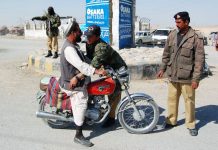
Peshawar: Sayyed Ali Nawaz GIllani is considering not to use the bus service provided by the school administration for shuttling his children between school and home anymore.
In the wake of gruesome incident at an Army-run school in Peshawar that left about 150 people, mostly students, dead on December 16 last, Gillani fears that school buses, carrying scores of kids, are soft targets for terrorists.
“Being a parent I am very disturbed”, a perturbed Gillani told News Lens. “I am thinking of taking children to school in my car.”
Muhammad Aneesur Rahman, a parent living in the Faqeerabad neighborhood of Peshawar, is also thinking of making alternative arrangements for his kids to study. A family in this neighborhood lost two children in the terrorist attack on the Army Public School.
“The situation is extremely alarming”, said Rehman. “I am totally mixed up about what to do: should I continue sending my kids to schools and risk their lives or keep them home,” says Rahman.
He fears that after the crackdown on the terrorists, especially withdrawal of moratorium on hangings of terrorists, there may be a retaliation.
Syed Shakoor Hussain Shah, a teacher at the Government Primary School, Chulghalpura — a neighborhood in Peshawar’s suburbs — says he is very concerned about the security of his school.
He says that the terrorists hit an army-run school because the military had launched an operation against them in the North Waziristan Agency and other tribal areas. “But one thing must be kept in mind that the army has support from the government to carry out the operation and so the terrorists can also target government-run public schools to force it to review its policy for eradication of terrorism,” he says.
Shah says that it is next to impossible for the authorities to provide security to each and every school in the province.
According to the data available with Department of Elementary and Secondary Education, there are 28,309 schools in Khyber Pakhtunkhwa — 23,290 of them are primary schools, 2,639 middle schools, 2,029 high schools and 361 higher secondary schools. According to the department, the number of private schools is close to 7,000.
Muhammad Quraish Khan, a senior police officer who presently heads the Forensic Science Lab in Peshawar, told News Lens that even if the schools are provided with a single security guard – insufficient to the highly trained and combat hardened terrorists – would mean deploying over 28,000 policemen at schools.
“This is not feasible”, he said, because the provincial police department is already stretched fighting terrorism and short of men.
Riaz Bahar, principal of the Government High School Civil Quarters in Peshawar, told the News Lens that the government had issued instructions to ensure security of schools, but they did not seem adequate.
The instructions, he said, included raising walls of the schools and putting razor-wires on them; checking at the school entrance, informing police about the total strength of students and staff at the schools etc.
As per instructions, he said, every teacher would have to act as security adviser to the school and parents.
“Are we trained for this?” said Bahar. “No. What we are trained for is imparting education.Security is the job of police and security forces.”
Quraish Khan, the police official, sounded optimistic however, saying the terrorists would not hit public schools because it would isolate them from their sympathizers.



